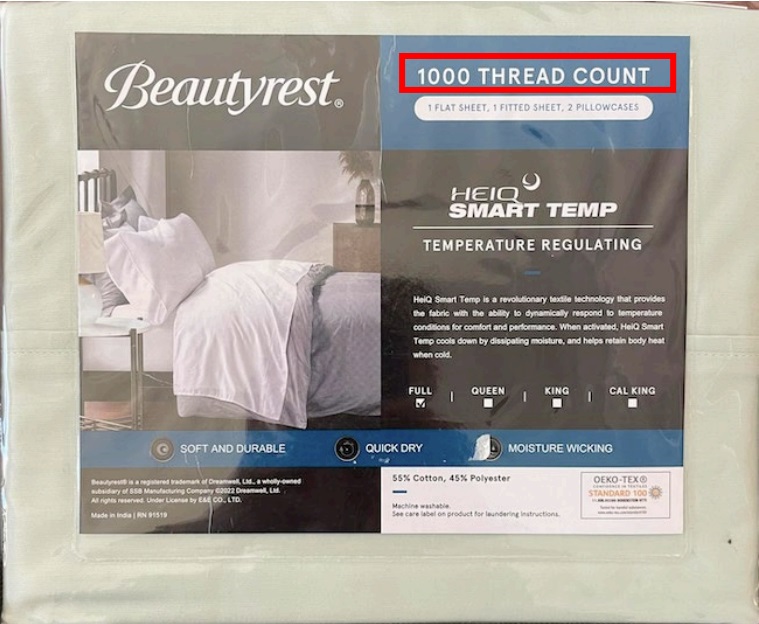Class Action Says Beautyrest, Madison Park Sheets Labeled With ‘Inflated’ Thread Counts
Staples et al. v. E&E Co., Ltd.
Filed: January 4, 2024 ◆§ 4:24-cv-00077
A class action claims certain Beautyrest- and Madison Park-brand bedding products are advertised with inflated thread counts.
California Business and Professions Code New York General Business Law California Unfair Competition Law California Consumers Legal Remedies Act
California
A proposed class action claims certain Beautyrest- and Madison Park-brand bedding products are advertised with inflated thread counts.
Want to stay in the loop on class actions that matter to you? Sign up for ClassAction.org’s free weekly newsletter here.

Specifically, the 28-page lawsuit alleges that despite the label representations that Beautyrest sheets and pillowcases have a 1,000 thread count, independent testing has revealed that the products are, in fact, made with a thread count of 216. In addition, testing showed that Madison Park sheets and pillowcases advertised as having a 1,500 thread count are actually made with a thread count of between 237 and 295, the suit says.
The case argues that the allegedly false thread count claims, which are found on the packaging and in online retailers’ product listings, mislead consumers into believing the bedding is more durable, softer and of a higher quality than it actually is.
What’s more, defendant E&E Co., Ltd.—the California-based company behind the products—knows that consumers will pay more for items with a greater thread count based on their belief that it indicates a higher-quality product, the complaint adds.
According to the filing, the company uses a method of measuring thread count that is inconsistent with industry standards and “designed to falsely inflate” a product’s true thread count. Per the lawsuit, the practice—which involves individually counting plies in a yarn rather than collectively counting them as “one yarn”—leads to a “thread count inflation of double or triple (or higher) the thread count as would be measured using traditional industry standards.”

As the suit tells it, not only did the American Textile Manufacturer’s Institute condemn the defendant’s nontraditional methodology in 2002, but three years later, the Federal Trade Commission wrote in a letter to the National Textiles Association that the practice could deceive or mislead consumers about a product’s true thread count.
“[The defendant] knows that its method of calculating thread count is misleading and not based on industry standards for determining thread count,” the case relays. “By representing that its Products had higher thread counts than the products really have, [the company] unjustly profited from the sale of such bedding and linen products to consumers.”
The lawsuit looks to represent anyone in the United States who purchased any Beautyrest product advertised as having a thread count of 1,000, or any Madison Park product marketed as having a 1,500 thread count, during the applicable statute of limitations period.
Get class action lawsuit news sent to your inbox – sign up for ClassAction.org’s free weekly newsletter here.
Video Game Addiction Lawsuits
If your child suffers from video game addiction — including Fortnite addiction or Roblox addiction — you may be able to take legal action. Gamers 18 to 22 may also qualify.
Learn more:Video Game Addiction Lawsuit
Depo-Provera Lawsuits
Anyone who received Depo-Provera or Depo-Provera SubQ injections and has been diagnosed with meningioma, a type of brain tumor, may be able to take legal action.
Read more: Depo-Provera Lawsuit
How Do I Join a Class Action Lawsuit?
Did you know there's usually nothing you need to do to join, sign up for, or add your name to new class action lawsuits when they're initially filed?
Read more here: How Do I Join a Class Action Lawsuit?
Stay Current
Sign Up For
Our Newsletter
New cases and investigations, settlement deadlines, and news straight to your inbox.
Before commenting, please review our comment policy.